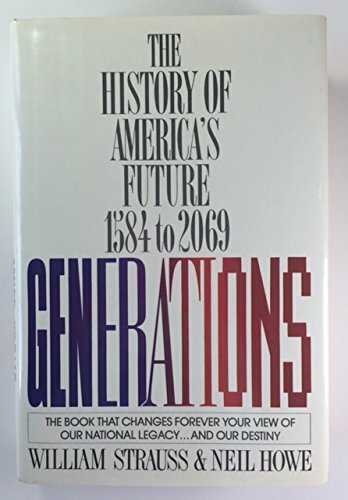I recently read Generations: The History of America’s Future, 1584 to 2069, and it got me thinking about how the book’s ideas apply to the present day. The authors, William Strauss and Neil Howe, theorize that a generational cycle occurs every 4 generations, with each generation having its own distinct archetype. These archetypes are (in order) the Idealist, the Reactive, the Civic, and the Adaptive. The Idealists and the Civics are considered active generations since they are responsible for either causing a spiritual awakening (such as the Great Awakening), in the Idealists’ case, or resolving a secular crisis (such as the Civil War), in the Civics’ case. The passive generations, the Reactives and the Adaptives, then reap the benefits as well as deal with consequences of their predecessors’ actions. According to Strauss and Howe, the Millennials are a Civic Generation and Gen Z is a Reactive Generation. This information can help us understand these two generations as well as our present time better.
While I found this theory interesting, I wasn’t fully convinced until they predicted the date of the next secular crisis—the year 2020. Note: this book was written in 1991. They write that during this crisis, “the sense of community will be omnipresent. Moral order will be unquestioned, with ‘rights’ and ‘wrongs’ crisply defined and obeyed. Sacrifices will be asked and given. America will be implacably resolved to do what needs doing, and fix what needs fixing.” In general this has been the case throughout the pandemic. Various precautions such as masks and quarantining soon became not only a question of safety but of morality. Personal freedom has been given up for the sake of the broader community. While not everyone has been on board, people have generally been compliant, giving up what is necessary to fight together. In this way, the Civics (in this case the Millenials) have increased a sense of community, although ironically increasing loneliness in the process.
Gen Z suffers the most from Millennials’ decisions. Gen Z struggles with loneliness and depression more than the previous generations, and Covid has only made that worse, normalizing virtual interactions over in-person ones. I talk more about Gen Z’s loneliness as well as a possible solution here. Also, Millennials’ political and social agendas have created instability for Gen Z kids, especially the LGBT movement. Kids are now trying to figure out their gender and sexuality, things previous generations didn’t even think to question. Once they decide on their gender and sexuality, they are encouraged to find their identity in it. The problem is when people place their identity in something so unstable and changeable, their identity becomes unstable as well, leaving them feeling lost. A clear example of this is found in the idea of gender fluidity, recently popularized through the internet. Those who identify as gender fluid claim that their gender can change, as one girl on Tik Tok says, “on the day or the week or even depending on the hour.” Gender Fluidity takes the instability caused by the LGBT movement to a new level, because stability is not promised once you “find yourself.” Even after you “find yourself,” who you are is still constantly changing. This combination of isolation and identity-questioning is hurting Gen Z, leading to their poor mental health.
According to Strauss and Howe, Gen Z is an adaptive generation. This means they will hold traits from both the previous civic generation as well as the upcoming idealist generation, trying to find a compromise between the two. So while Gen Z will probably not end up as radical as the millennials, they will still buy into a lot of what they have promoted, as we are seeing now. It isn’t until the next generation, Alpha Gen, comes of age will we start seeing serious change in our culture since they are supposed to bring the next Spiritual Awakening. This Spiritual Awakening will meet internal needs as opposed to external needs, such as physical safety and health, promoted by the Millennials. Does this mean our only hope is to wait around another 20-40 years? No. The Strauss Howe theory only claims to detect a pattern, not fate. That means it is possible to turn the tide. That said, it is unlikely that this cultural trend can be reversed in the near future. While the big picture most likely will remain the same, we can make changes in our personal lives and communities. Right now, the best way to help Gen Z, as well as other generations, is to offer support and provide an alternative to the current leftist message. Remember, the cultural trends we’re seeing now aren’t permanent. So don’t lose hope and continue being the change you want to see.



Comments
Leave a Reply